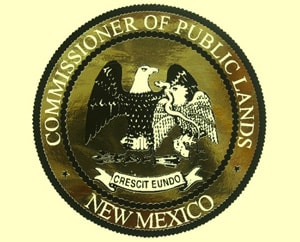
Assistant land commissioner needed to do more to disclose his personal business with the land office, state lawmaker says
Jerry King is part of a storied New Mexico family that includes a former governor, current attorney general and other elected officials. He and other members of his family own ranches around Moriarty and have several agricultural leases with the New Mexico Land Office.
King is also an assistant commissioner in that office who, according to the office’s Web site, handles “special projects.” That includes facilitating negotiations between the land office and “existing lessees, lease applicants, landowners, local-level governments, etc.,” land office spokeswoman Kristin Haase said.
King hasn’t hidden the fact that companies in which he has a financial interest do business with an office at which he is a top administrator. A Jan. 1, 2003 form on file with the land office discloses that he is a partner and shareholder in King Land & Cattle Co. and Pine Canyon Ranch Corp., which both have state land leases, and that his father holds land leases through the company King Bros. Ranch.
“I will avoid any conflict that may arise,” a handwritten note on King’s “Certificate Regarding Conflict of Interest” form states.
But at least one state lawmaker who has been involved in attempts to reform the land office is questioning whether King’s disclosure on the 2003 form was sufficient. Several others say the state’s disclosure laws are in need of reform.

Rep. Nate Cote, D-Las Cruces, said having a form on file at the land office isn’t sufficient because he and others dealing with King didn’t know to look for it. Cote said he didn’t know about King’s land leases until told by this reporter.
Cote has led the charge in recent years to get the attorney general — Gary King, Jerry King’s first cousin — and the state auditor to scrutinize a controversial deal between the land office and a Las Cruces developer. Cote was also one of three Las Cruces-area lawmakers who proposed a series of land office reform bills earlier this year.
Most were unsuccessful, but a bill that requires competitive bidding on all land office development leases was approved — with the backing of the land office. Jerry King, Republican Land Commissioner Pat Lyons and others in the land office lobbied against most of the other proposals.
Cote said he’s concerned that King’s business dealings with the land office might have influenced his lobbying for the land office.
“I think Jerry, knowing what I know now, was probably a bit out of line with his activities during the session in trying to get our legislation killed,” Cote said. “When anyone doesn’t do full disclosure, and it’s disclosed later, I think they’ve lost credibility with the public.”
King refuses to answer questions about situation
Another lawmaker who dealt with King during the Legislature’s consideration of the reform proposals says he saw no evidence of a King conflict. Rep. Elias Barela, D-Belen, said when a committee he sits on considered and eventually tabled some of the bills, King was “cordial.”
“Never saw any conflicts,” Barela wrote in an e-mail, adding that King told the committee he understood its point of view after it tabled the bills.
King originally said in early July that he would be happy to discuss the situation with me and had “nothing to hide.” He agreed at that point to respond to e-mailed questions and then be available for a follow-up phone interview.
He never responded to that e-mail. Since it was sent, he has not responded to multiple phone calls and e-mails seeking comment. Lyons, his boss, has also not returned a call seeking comment.
State law doesn’t require written disclosure
The New Mexico Governmental Conduct Act states, “Full disclosure of real or potential conflicts of interest shall be a guiding principle for determining appropriate conduct. At all times, reasonable efforts shall be made to avoid undue influence and abuse of office in public service.”
The land office requires all employees who have a conflict related to a land lease to fill out a form similar to the one King signed in 2003. Land Office General Counsel Robert Stranahan pointed out that the state statute requires disclosure, but not that it be made in writing, so he said Lyons’ policy “goes further” than is required.
Ray Powell, a former land commissioner and Democrat who is running for the office again next year, had a similar policy when he ran the office from 1993-2001. Like Lyons’ policy, it didn’t formalize how the office would deal with conflicts, but did ensure disclosure of those conflicts was made to the land office in a document that was available to the public.
“We felt, particularly with the nature of the business at the land office, that it was extremely important,” Powell said.
Asked how he dealt with conflicts that arose, Powell said it was on a case-by-case basis. For example, he said one employee’s family had land leases, so another employee was assigned to deal with those leases.
The action he took in response to the disclosure of a conflict wasn’t necessarily documented anywhere, Powell said.
Whether King has faced any employment restrictions because of his conflict isn’t known because he and Lyons aren’t talking. The form King filled out places no restrictions on what he can do.
‘Reform is needed’
Sen. Steven Fischmann, D-Las Cruces, and Jim Baca, who was land commissioner from 1983-86 and 1991-1993, were among those who said the state’s conflict-of-interest laws are sorely lacking.
“Like so much in New Mexico government, conflict-of-interest laws are vague and inadequate. Reform is needed in the land office, but that’s probably true across state government,” said Fischmann, who joined Cote in proposing reform earlier this year.
Baca said the state’s conflict-of-interest laws “throw a pretty small net.”
“They don’t really get into any sort of particulars,” said Baca, who is currently the state’s natural resource trustee. “What would be valuable is an ethics department or something that could look at these on a case-by-case basis.”
Steven Robert Allen, executive director of Common Cause New Mexico, has an idea about how to start improving the state’s conflict-of-interest laws.
“In the 21st Century, it’s ridiculous that New Mexico still has so many disclosures of this sort that are done in a hand-written or scanned format,” he said. “As is true with campaign reporting, we really need to move into the modern age and create disclosure systems that are accessible and searchable in an online and digital format.”